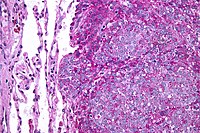
Photo from wikipedia
AIM We aimed to evaluate the prevalence of silent anatomic variations of the chest wall, to estimate frequency in different age groups, and to answer are these variations more prominent… Click to show full abstract
AIM We aimed to evaluate the prevalence of silent anatomic variations of the chest wall, to estimate frequency in different age groups, and to answer are these variations more prominent with age? MATERIALS AND METHODS Thorax CT scans of 592 children were retrospectively reviewed. 82 children who underwent CT for evaluation of the suspected chest wall deformities, chest wall lesions, prominent scoliosis, and who had chest wall surgery, thoracotomy, or trauma causing chest wall or clavicular fracture were excluded from the study. The frequency of silent anatomic variations was evaluated and compared with age subgroups and sex. RESULTS 118 of 510 patients had variations of the chest wall (23.1%). The most common silent variation was the prominent convexity of the costal cartilage (n = 36, 30.5% of the variations). A significant difference existed in the frequency of variations between age subgroups (p < 0.001). CONCLUSION A high rate of silent variations indicates that asymptomatic asymmetries of the chest wall are mostly benign and there is no need for further imaging. An increase in the frequency of the variations with age supports the hypothesis that these findings are mostly developmental instead of congenital and become more prominent with growth.
Journal Title: European journal of radiology
Year Published: 2021
Link to full text (if available)
Share on Social Media: Sign Up to like & get
recommendations!